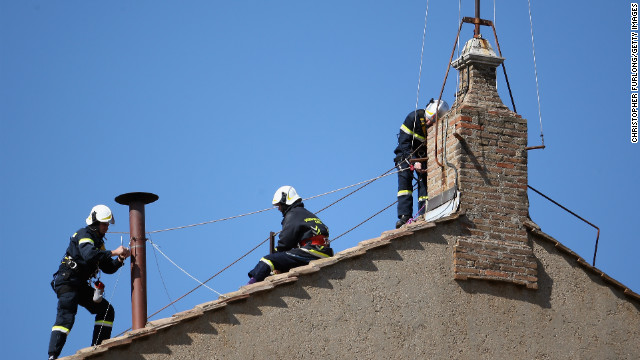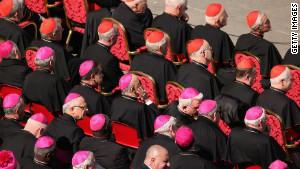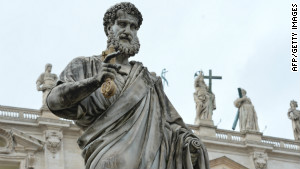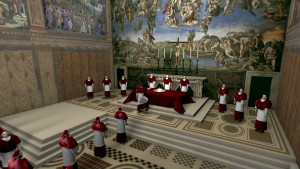Sat March 9, 2013
 Rome, Italy and Holy Seed -- Vatican workmen scaled the roof of the Sistine Chapel Saturday, as they installed the chimney which will release the black or white smoke that signifies whether a new pope has been elected.
Rome, Italy and Holy Seed -- Vatican workmen scaled the roof of the Sistine Chapel Saturday, as they installed the chimney which will release the black or white smoke that signifies whether a new pope has been elected.
 Vatican's men-only policy
Vatican's men-only policy
 Church's history of saints and sinners
Church's history of saints and sinners
 Inside the conclave: How it works
Inside the conclave: How it works

Members of the Vatican Fire Brigade install the chimney on the top of the Sistine chapel which will emit smoke.
STORY HIGHLIGHTS
- Vatican: The papal ring and seal belonging to Benedict XVI have now been destroyed
- A chimney is installed on the roof of the Sistine Chapel in Vatican City
- Once the conclave starts, it will release smoke that signals whether a new pope is elected
- The 115 cardinal-electors will vote for the first time on Tuesday afternoon
The chimney is the first publicly visible sign of the preparations going on inside the chapel, which is where the Roman Catholic cardinals will gather on Tuesday for the start of the conclave -- the secret papal election.
Footage released by the Vatican has shown the installation of two stoves inside the chapel. One is used to burn the cardinals' ballots after they are cast and the other to send up the smoke signal.
If no one has won, a chemical is added to make the smoke black. This lets people waiting in St. Peter's Square below -- and the people watching on TV around the world -- know what is happening.
 Vatican's men-only policy
Vatican's men-only policy Church's history of saints and sinners
Church's history of saints and sinners Inside the conclave: How it works
Inside the conclave: How it works
White smoke means a new pope has been chosen.
If the smoke is released after dark, a spotlight will be trained on the chimney so that it can still be seen, Vatican spokesman the Rev. Federico Lombardi said Saturday.
The stove will be tested before the conclave to make sure it can produce smoke, Lombardi said, but privately, so as not to cause too much excitement.
The cardinals met Saturday morning for the latest in a series of sessions known as General Congregations.
These are open to all the cardinals, not just those aged under 80, and are an important part of the preparations for the election.
As well as getting to know their counterparts from around the world, the cardinals discuss the major issues facing the church, including its handling of allegations of child sex abuse by priests and a scandal over leaks from the Vatican last year that revealed claims of corruption, as well as the church's future direction.
The final General Congregation will take place on Monday, the Vatican said. More than 130 cardinals have already spoken at the meetings.
Once the conclave starts, the 115 cardinal-electors can't leave Vatican City until the process is done and aren't allowed to speak with anyone outside of the conclave.
They stay in a Vatican hotel, Casa Santa Marta, for the duration and, in line with tradition, drew lots for their rooms during Saturday's meeting.
'Praying a lot'
The cardinal-electors will move into Santa Marta first thing on Tuesday, the Vatican said. They will then attend a special morning Mass in St. Peter's Basilica.
The first vote will be held that afternoon, with subsequent ballots cast over the following days until one of the contenders gains the two-thirds majority that means he is elected head of the world's 1.2 billion Catholics.
The longest conclave held since the turn of the 20th century lasted five days.
The Sistine Chapel, whose famous ceiling was painted by Renaissance artist Michelangelo, has been closed to tourists while the preparations for the conclave are made.
Cardinal Timothy Dolan of New York, one of about a dozen leading candidates to become pope, wrote in a blog post Friday that he misses New York after 10 days and is sorry he won't be there on St. Patrick's Day.
"We cardinals sure are praying a lot," he said.
Contrary to media reports, he said, the focus of the cardinals' meetings is much the same as it was two millenia ago, namely: "How most effectively to present the Person, message, and invitation of Jesus to a world that, while searching for salvation and eternal truth, are also at times doubting, skeptical, too busy, or frustrated."
This means discussions on such subjects as preaching, teaching the faith, care of the poor and sick, and support for the church's clergy and the families that make up their congregations, Dolan said.
"Those are the 'big issues.' You may find that hard to believe, since the 'word on the street' is that all we talk about is corruption in the Vatican, sexual abuse, money. Do these topics come up? Yes! Do they dominate? No!" he wrote.
Ring destroyed
Meanwhile, the Italian press is full of speculation about which cardinal may win enough support from his counterparts to be elected, and what regional alliances are being formed.
The United States has 11 of the 115 votes, making it the second largest national bloc after Italy.
Lombardi, the Vatican spokesman, said Saturday that the symbolic Fisherman's Ring and the seal that Benedict XVI used as pope have been scratched to render them invalid.
Three other symbols of Benedict XVI's papacy were destroyed in the same way, he said. The next pope will get a new Fisherman's Ring and seal with his own name on it after he is elected.
Benedict XVI resigned 10 days ago, becoming the first pontiff to do so in six centuries.
We recommend
| |
No comments:
Post a Comment